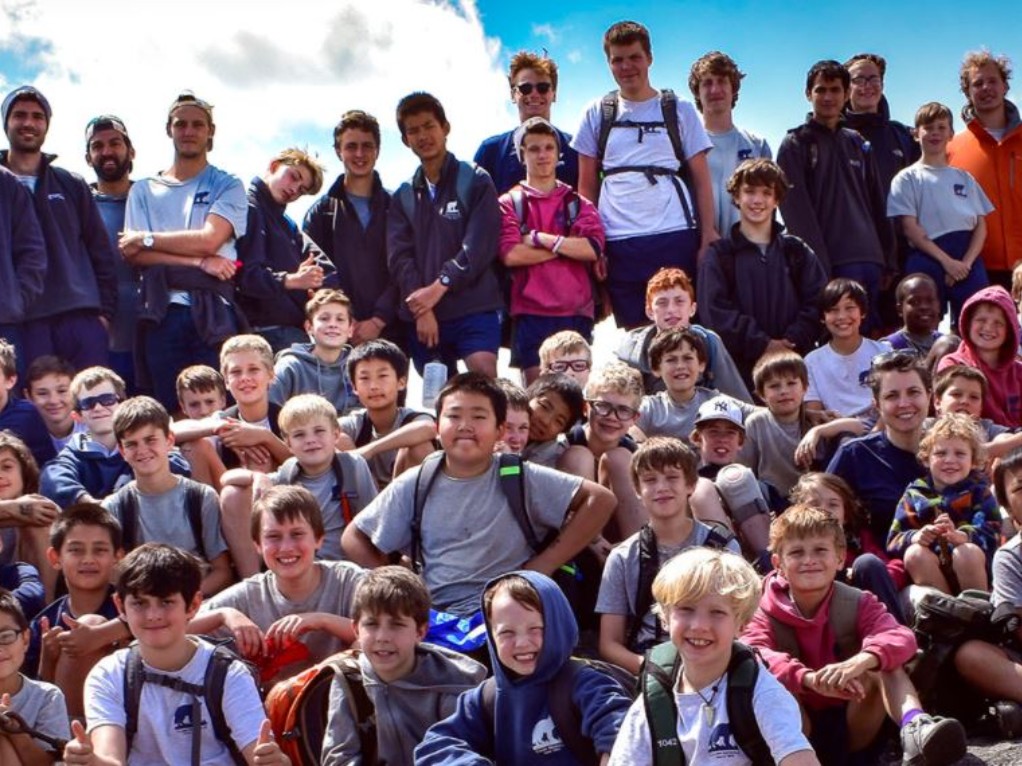
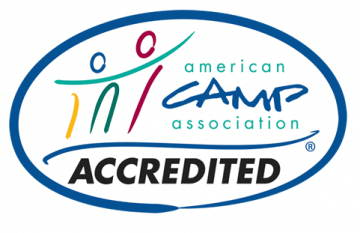
Mowglis campers age 10 and up choose 100% their activities, which we call “Industries.” Campers ages 7 to 9 in the Cub Program rotate through (almost) all of our activities, experiencing each as a group.
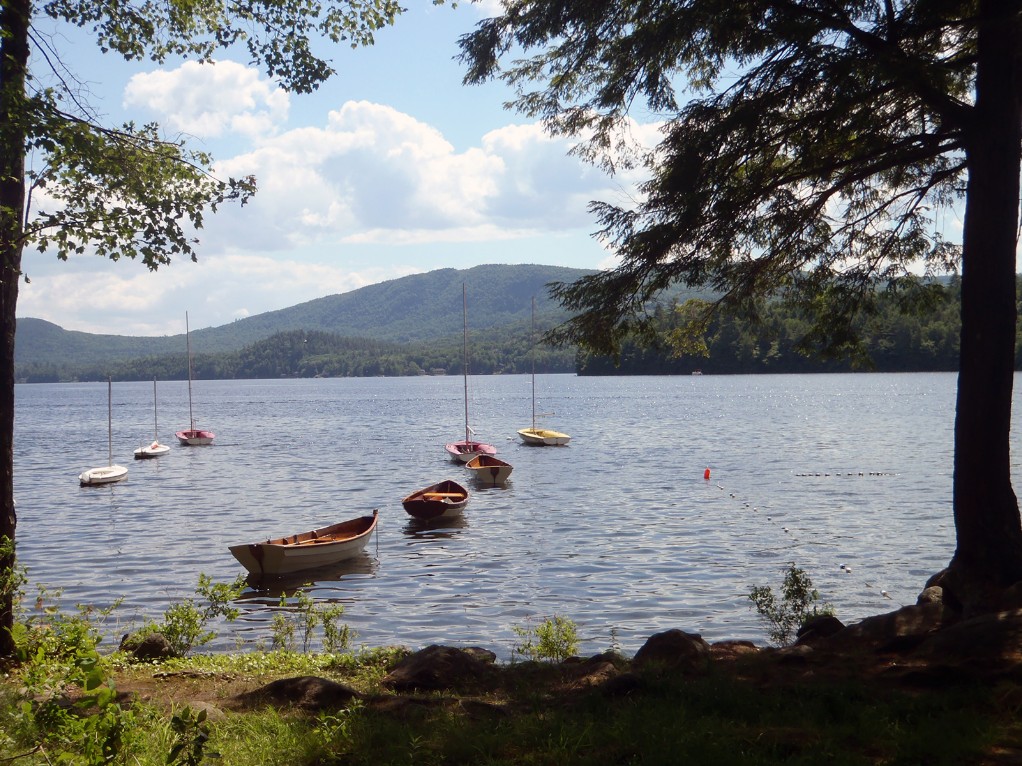
Instruction and Skills
Each Industry has a particular series of skills or ribbon requirements that a camper must master to earn that Industry’s ribbon. The ribbons are valued for the skills and accomplishments they represent. Campers who earn four or more ribbons are invited to sit in the Inner Circle at the campfire in an end-of-summer ceremony that is both moving and memorable.
During each of the daily industry periods, campers work with experienced counselors to have fun, learn new skills, and progress toward mastering those skills. Our highly skilled and enthusiastic instructors, and the ribbon requirement structure of each Industry encourages Mowglis campers to become experienced and proficient in their chosen Industries…all the while having a ton of fun!
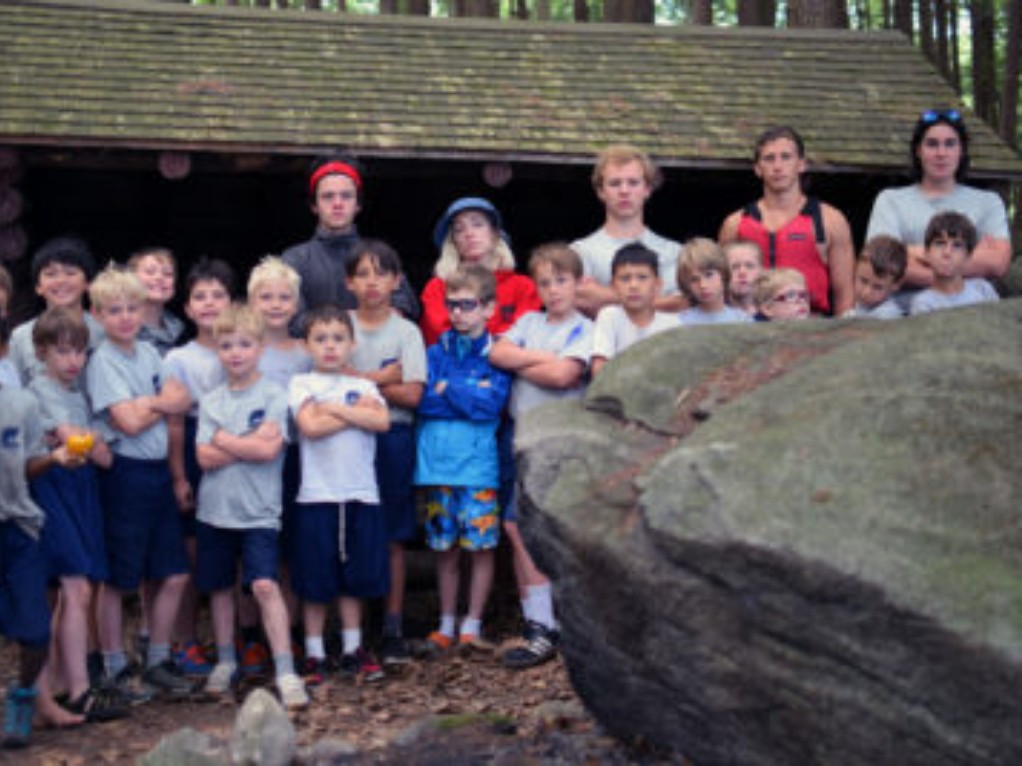
How a Regular Mowglis Day is Structured
There are three, one hour-long industry periods each day. Two of these periods last for two weeks and allow campers to build solid skills in their chosen pursuits. The third daily activity period is a daily sign-up, where campers select from our wide variety of land and water activities for just that period.
Campers are encouraged to try all the Industries and then choose where they want to specialize. As campers become proficient, they help teach younger campers. These experiences, new skills, and achievements often turn into lifelong interests and hobbies. Visit the Mowglis daily schedule to learn more.
A Typical Day
A Mowglis day is a beautiful thing.
Although no two days are exactly the same, every day is built on routine. Clear expectations and schedules provide a comfortable framework for the boys to grow within.
Our routine doesn’t make Mowglis feel like a boot camp. Far from it! But we do borrow youth development principles from a variety of places, and you’ll notice a few nods to the wonderfully transformative practices of the military.
One central part of a Mowglis day is working towards earning ribbons. Ribbons are our version of Boy Scout badges and require dedication and proficiency. Boys need multiple weeks — or even multiple summers — to fulfill the requirements for each ribbon. They have the freedom to choose their daily activities and how aggressively to pursue their ribbon goals.
Here’s what one day in the life of a Mowglis camper could look like:
7:15 a.m.: Wake-Up
You roll over in bed as the sounds of Revelry waft through your dorm window — the first bugle of the day. It’s a familiar sound because bugle tunes play throughout the day, signaling a new session.
You get out of bed, brush your teeth on the back porch, get dressed in your uniform (simple gray top and blue shorts, same for everybody) and fold up your sheets and blanket.
7:50 a.m.: Walk to Breakfast
You wash your hands and tuck in your shirt before entering the Dining Hall, knowing a day of The Mowglis Way has begun.
You load up your plate with pancakes, real maple syrup, sausage, scrambled eggs, and fresh fruit to fuel for a busy day! Then you go sit with your friends and chow down.
During breakfast, clipboards are circulated to pick your Sign-Up activities for the day. You look through the long list of options — swimming, archery, drama, crew, riflery, kayaking, soccer, rock climbing, photography, tennis, woodworking — and decide on today’s two. You sign up for Arts and Crafts (a tried and true favorite) and axemanship, which is completely new to you. You want to test it out and see how you like it.
9:00 a.m.: Duties Time
You check the duties board to see what duty you’re assigned to today. Cleaning the Dorm building is far from your favorite duty, but it’s not that big of a deal because you’ll rotate to something new tomorrow.
Plus, it’s The Mowglis Way to bring your all into everything you do. So you do your best, knowing you’re playing an important part in keeping camp clean for everyone.
When you’ve done your best, you stand up straight and say “I have done my duty to the best of my abilities!” and the supervising counselor checks your work. He approves and you head to your first industry of the day.
9:30 a.m.: First Industry Period
Unlike Sign-Up periods which can be different every day, each Industry activity lasts for two weeks. The goal of Industries is to help campers develop and see a noticeable progression in their skills. To learn more about our Industries, click here.
Your first Industry period is Archery. Yesterday, you learned all about the different parts of the bow and arrow and today, the instructor teaches you how to safely load it. At the end of the period, you practice loading the arrow yourself and the instructor tells you that tomorrow, you’ll start shooting at the target. You can’t wait!
10:45 a.m. First Sign-Up Hour
You head to your Arts and Crafts session. You’ve been working on your pottery skills and your latest vase is ready to be painted. You grab a shiny black glaze (to match the Black Ribbon you’re working towards) and a paintbrush and get to work.
12:15 p.m.: Lunch
After heading back to your dorm to freshen up, you walk to the dining hall for lunch.
On the menu today is tomato basil soup, grilled turkey and cheese paninis, and fresh green salad. You grab a little of everything and chill with your friends while you eat.
1:00 p.m.: Rest Hour
This is your time to relax — an unstructured hour to socialize, sleep, play games…whatever you want to do! You go to the tetherball court for a lazy game with a few friends.
2:00 p.m.: Clean Up Time
It sounds crazy, but you actually kind of like getting the dorm ready for daily inspection. You feel a sense of pride when your space looks sharp. Plus, your dorm is only two “10”s away from earning an ice cream party!
You organize your belongings in the dresser next to your bed, put away your flashlight, and make sure your bed is properly made. You finish with a few minutes to spare so you grab the broom and sweep the common area (it’s The Mowglis Way).
Then you stand at the foot of your bed and salute the counselor of the day as he comes in to make sure your dorm is sufficiently clean. He awards you a 9 — someone forgot to put away their shower caddy on the porch. You’ll have to pay closer attention to that tomorrow!
2:30 p.m.: Second Industry Period
You head down to the waterfront for sailing. You’ve been in this Industry for a few sessions now (you can’t get enough!) and you’re really starting to master the activity.
Today, the sailing instructor is teaching everybody how to rig a 420. She lets you show the younger campers how to get the sails ready before you take the boat out onto the water, which is really cool. You like helping the younger guys learn the basics and help them grow as sailors.
3:45 p.m.: Second Sign-Up Period
For your second Sign-Up of the day, you’re trying axemanship. Because it’s your first time, the instructor starts by showing you the different parts of an ax. He explains the proper way to hold it, how to use it in a safe way, and how important it is to be mature and respectful when handling any sharp tool.
Then, he hands you the ax, handle-first. You gently take it and feel the weight in your hand. Under the instructor’s watchful eye, you chop up a piece of firewood — which you walk over to the campfire circle to use for tonight’s campfire.
At the end of the session, you’re not really sure if axemanship is for you. But you’re glad you tried it.
4:45 p.m.: Soak
This is the all-camp swim. Everybody goes down and jumps in the lake.
There’s no instruction (that only happens in the Swimming industry) so you can do whatever you want. You and your buddy take a raft out and float on the lake for a while. Then you head back to the dorm to get dressed for dinner.
6:00 p.m.: Dinner
At Camp Mowglis, we take great pride in offering varied menu options and using high-quality ingredients. We source all of our produce locally, all of our beef is grass-fed organic, and we aim to work with farmers who use sustainable and ethical farming practices whenever possible.
Tonight is your favorite: Taco Tuesday. You grab two ground beef tacos and load on the shredded cheese, guacamole, tomatoes, and lettuce. You wolf them down and are still hungry so you go back for seconds and take a grilled chicken and veggie fajita back to the table.
Once you finish dinner, you’ve got some down time to unwind. You see a few guys from your dorm playing frisbee on Gray Brother’s Field and you join in the game.
7:30 p.m.: Colors Ceremony
After checking that your uniform still looks presentable, you walk down to the flag and line up in formation.
The camp has a proper military colors ceremony, complete with the bugle playing, as they lower the flag.
7:35 p.m.: Evening Campfire
You sit around the campfire circle with your dorm mates for the day’s wind-down.
Today, there’s a visiting alumnus who talks about his engineering job — while eating s’mores, of course.
It’s really cool! He tells you how he travels around the world setting up electronic equipment for USTA tournaments. He talks about what you need to do to become an electrical engineer and it sounds like a job you would really enjoy. (Note to self: see if you can add another science class to your schedule next year.)
8:45 p.m.: Call to Quarters
You go back to your dorm and get ready for bed. You brush your teeth, change into PJs, and play a game of Rummy out on the porch.
9:15 p.m.: Taps
Taps is the last song played on the bugle for the day. Everybody stops moving and talking when it plays and all the lights get turned off — the whole camp goes quiet and dark.
As soon as Taps ends, the lights come back on. You read and chat for a little bit until lights out at bedtime. You shut your eyes and quickly drift off to sleep, exhausted from a fun, full day, and ready for a new one tomorrow.
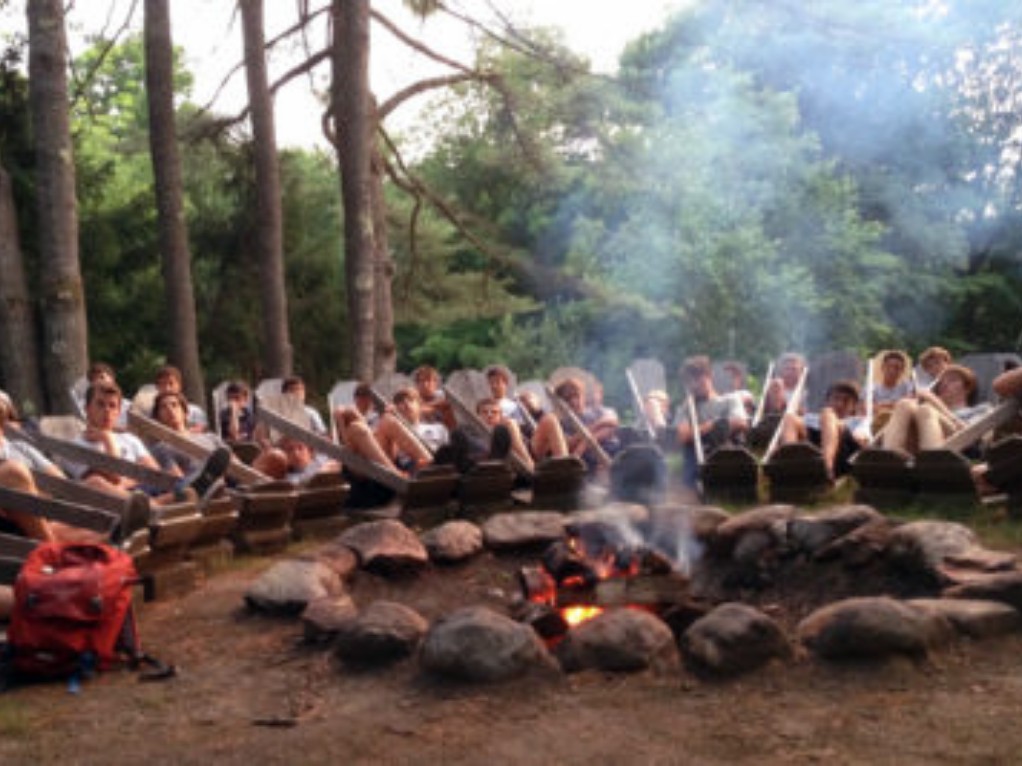
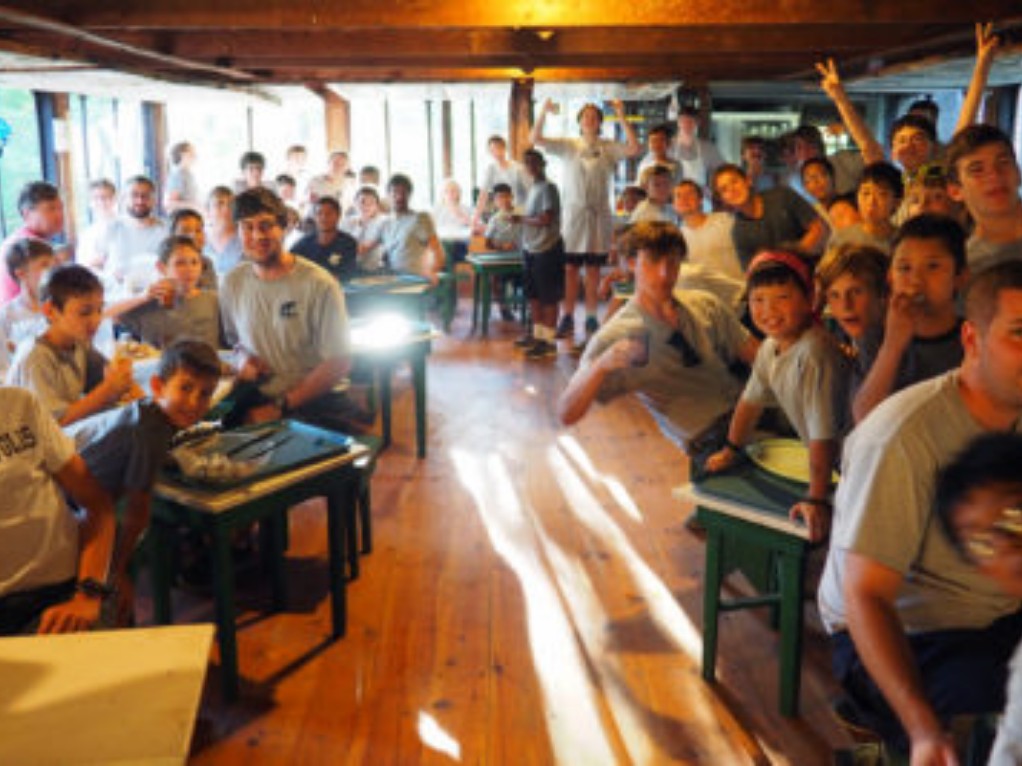
Room
Although there are over 30 buildings at camp, our campers and staff spend most of their time outside or in the water. Our cabins/dormitories are large open air buildings where the campers sleep and spend relax time with others their same age. There are six dorms at camp.
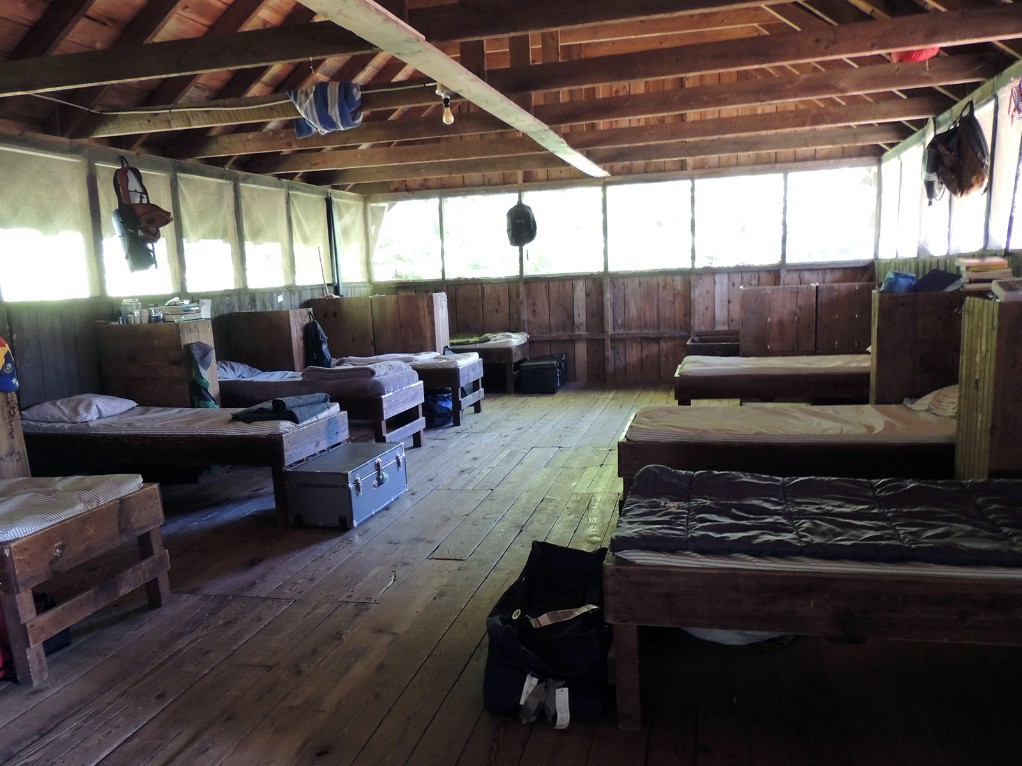
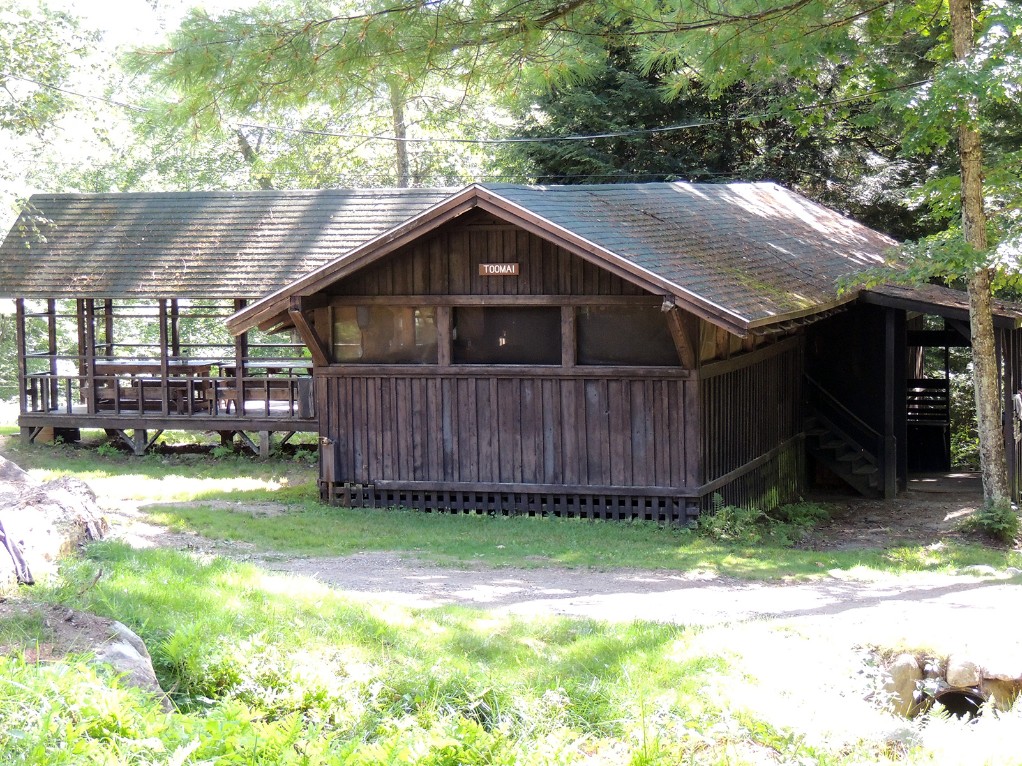
Food
We are proud to offer our campers fresh homemade meals, made with locally sourced vegetables from farms in New Hampshire and Vermont, homemade bread and desserts as well as great quality meats like organic grass fed beef. We can accommodate all food allergies, as well as vegetarians.
Health
All campers and staff will have three COVID-19 tests: before arrival, upon arrival, and after 5-7 days after arrival.
We will be conducting testing throughout the summer on an as-needed basis.
To protect our campers from possible COVID exposure, we will not be having parent visiting weekends. Still, you will hear all about how camp is going, and we’ll give you ways to connect with your son periodically.
Campers will be grouped by cohort for sleeping and eating (as in regular years).
Half of the activity periods (Industries) will be grouped by cohort, and half, not be grouped by cohort.
During mixed cohort activity periods, campers may need to either be socially distant (where possible) or wear masks.
Trips will still happen, as will the cherished all-camp events such as Woodsman’s Day, Landsports Day, Watersports Day, and of course CREW DAY!!
We are approaching this summer with an abundance of care and caution – we know that camp can be a tremendously safe place for kids as we have the ability to create a “bubble” to keep COVID out effectively.
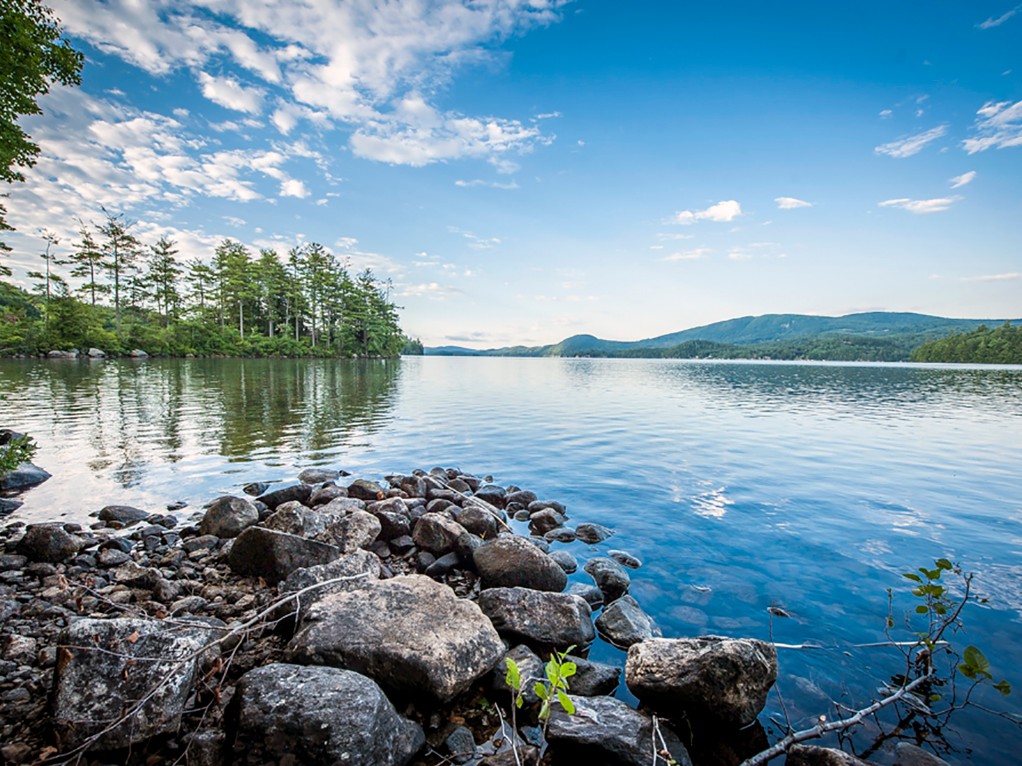
Archery
The Mowglis archery program offers an instructional opportunity for boys from novice to expert. Campers begin with the fundamentals of equipment safety and proper shooting technique. The Golden Arrow Husky Mark is awarded after displaying skill and safety and scoring a requisite number of qualifying targets.
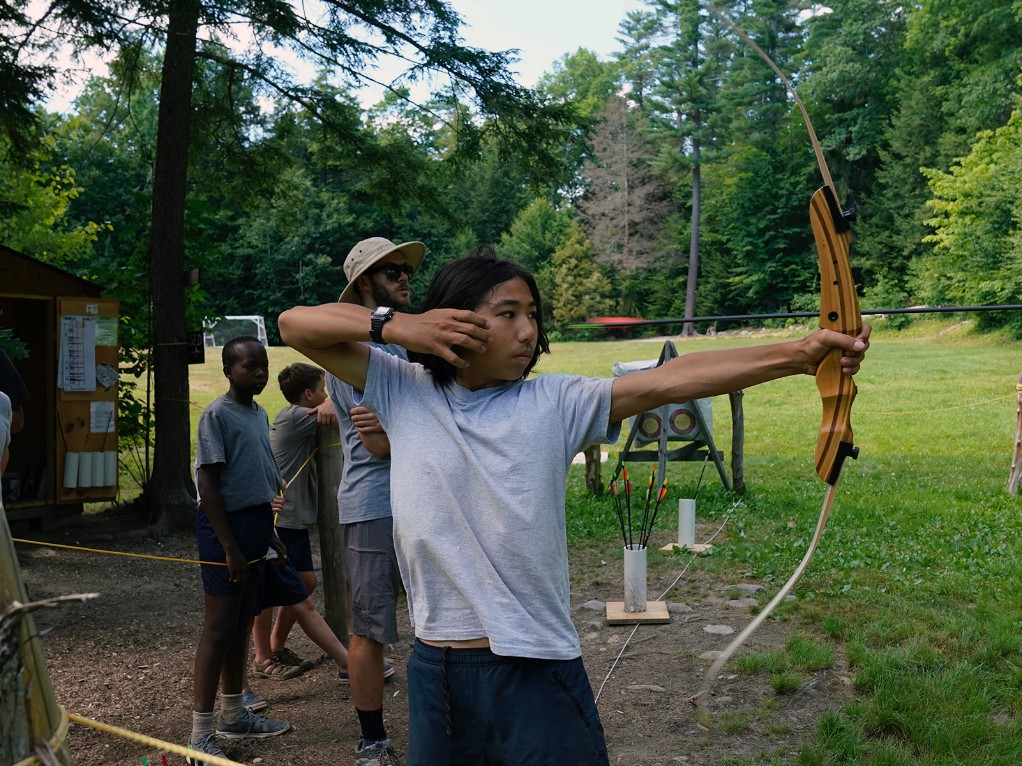
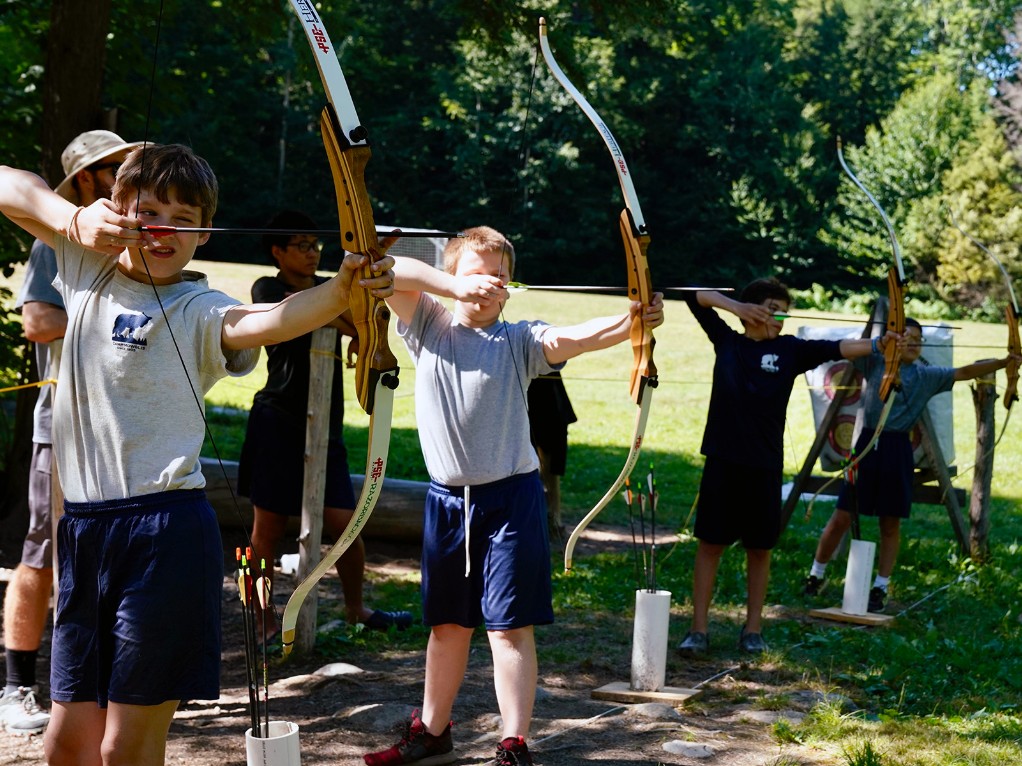
Arts and Crafts
The Mowglis Craft Shop buzzes with activity all summer, with a whole range of opportunities available, including leatherwork, drawing, painting, and pottery. The Black Ribbon is earned after a series of self-chosen projects are completed.
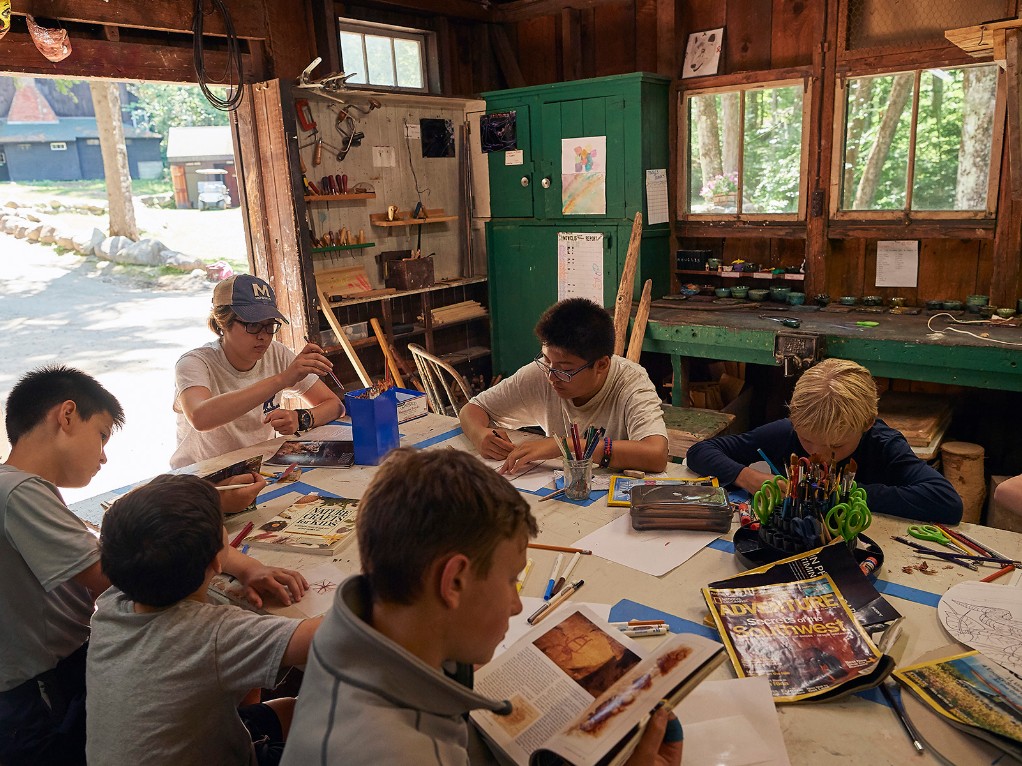
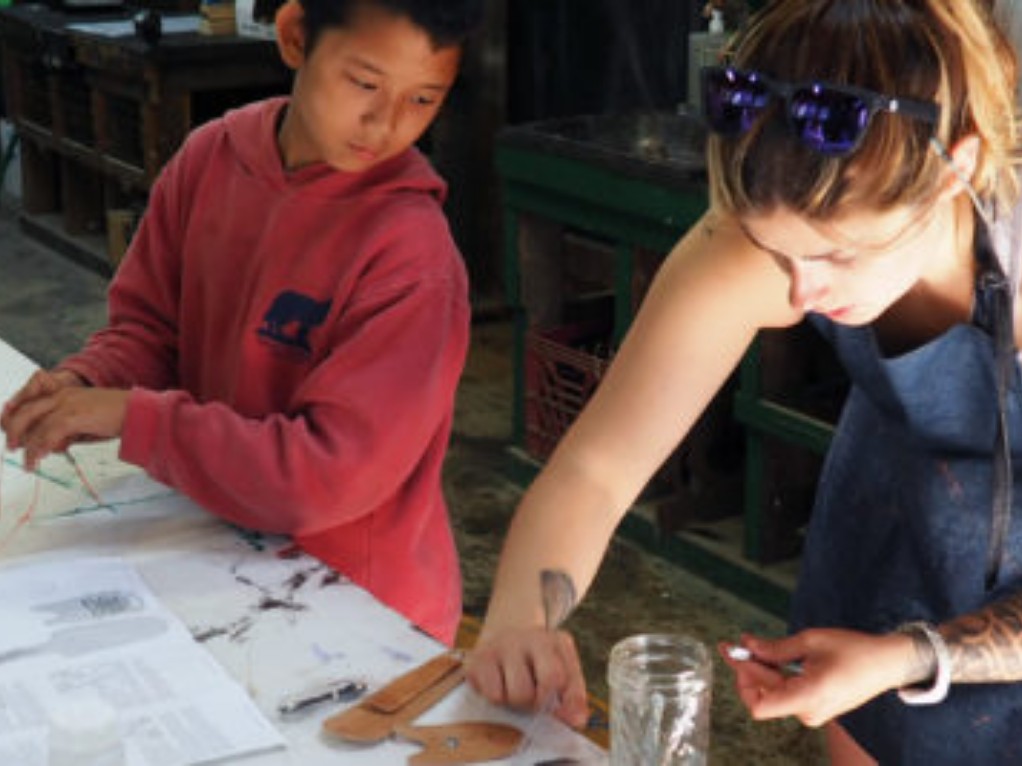
Axemanship
One of the more difficult and prestigious ribbons is the Orange Ribbon, awarded for proficiency in axemanship. Many years ago, Colonel Elwell developed a technique for safely teaching this skill, and Mowglis is one of the few camps that do it. Boys learn to use a knife, a hatchet, and then ax. The Orange Ribbon is available to campers ages 12 and older, with permission from home. They learn to split, chop, and finally to fell and to use their tree for a project to benefit the camp.
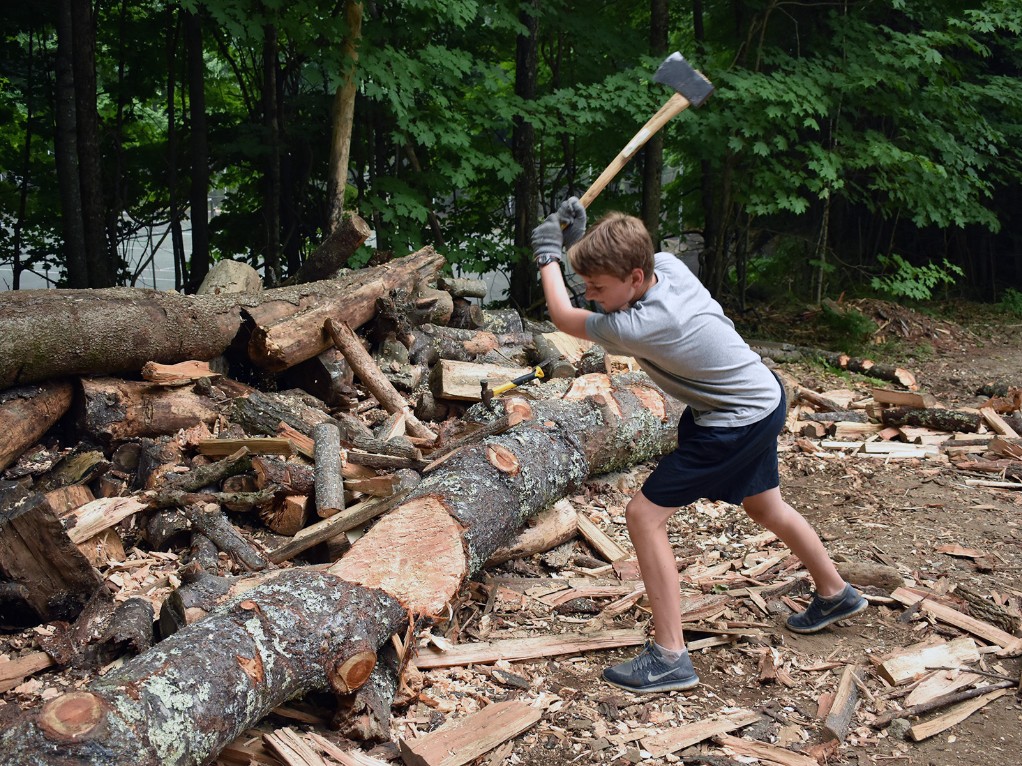
Bugling and Music
Mowglis is a very musical place. From “Reveille” in the morning to “Taps” at lights out, the Mowglis day is run by bugle calls. What is a bugle? It is like a trumpet, but without valves. Who plays the bugle calls? Campers do! That’s right, all of the daily bugle calls are performed by our campers who learn how to play them in Bugling Industry. Our campers take great pride in learning all the bugle calls and helping run the camp’s day.
In addition to the bugle, our campers sing, play the piano, and bring instruments from home. We have four pianos at camp, including one upright Steinway, which the campers are encouraged to practice on. Yes, Camp Mowglis is a very musical place indeed!
Camping
A basic foundation in camping skills is a requirement of all Mowglis Graduates. The Green Ribbon provides instruction in camping, backpacking, Leave No Trace principles, wilderness first-aid, trip-planning, basic orienteering and much more. Every Mowglis alumnus remembers completing his “fire-in-the-rain” requirement.
Canoeing and Kayacking
Mowglis has a long tradition of teaching boys the skills needed to paddle canoes safely in flat-water and rapids. The Canoe Safety, which covers basic flat-water boat handling, is a requirement for all Mowglis Graduates. Campers seeking the Red Ribbon will develop the skills needed to go on an exciting whitewater trip at the end of the summer. Mowglis Alumnus and Trustee Charles Walbridge, a nationally known whitewater expert, returns to camp each summer to pass on his skills. Charlie is a pioneer of American whitewater, and you can learn more about him by going here.
Cooking
Crew
One of the defining aspects of the Mowglis program is rowing or crew. All boys ages 10 and up learn to row in our unique Mowglis crew boats. These boats are custom built and differ from traditional shells in that they are more stable and better suited for learning. For more information visit our crew program page. Those who are particularly interested in crew pursue the Maroon Ribbon and also learn to row in our 4-man shells and single-man sculling vessels.
Drama
Every summer, several skits, and plays are learned, created, and directed by the boys and are performed for parents and alumni on visiting weekends.
Fencing
Foil, bout, epee, saber, en-garde… sound like a different language? Well, it won’t once you’ve learned to fence at Camp Mowglis! Fencing is one of our most popular Industries; it helps build motor skills as well as hand-eye coordination, reflexes, and strategy. We have all the necessary protective equipment, a spacious fencing studio, and professional instructors who ensure that this Industry is taught safely. So… En-garde!
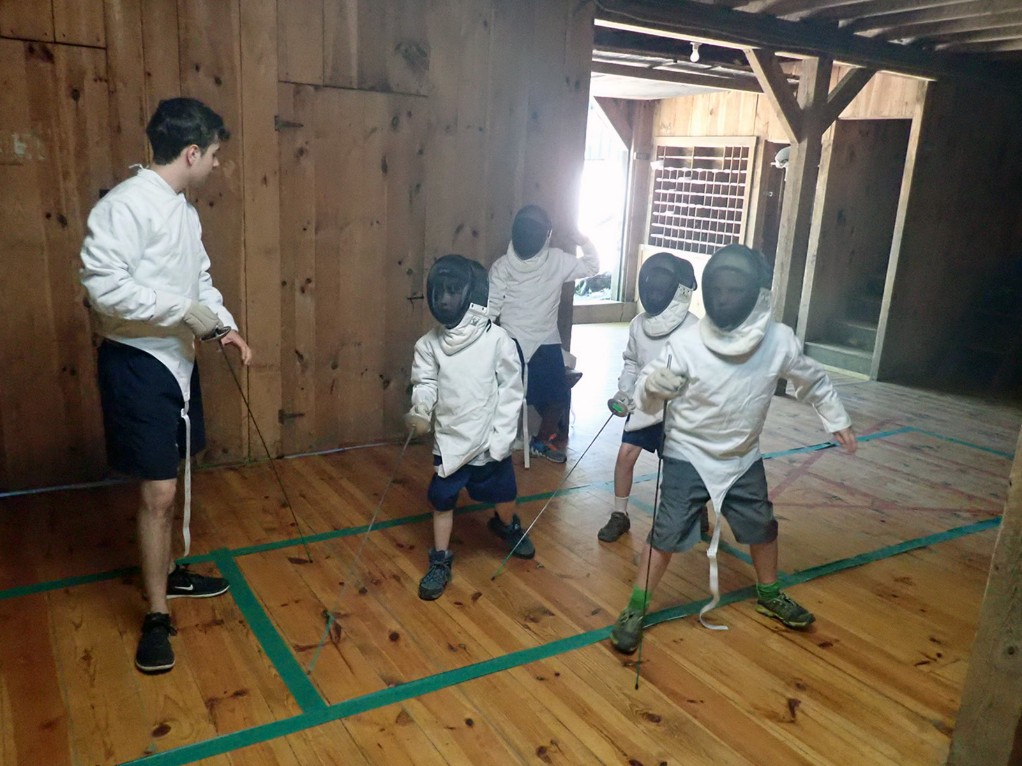
Fishing and Flycasting
Camp Mowglis is on one of the ten cleanest lakes in the world and is home to a LOT of fish! People come to Newfound Lake from all over the world for the fishing, and with the guidance of our fishing guide, our campers learn everything necessary to become bonafide anglers (fishermen). In addition to the early-morning fishing outings, we also teach fly fishing and fly casting. These are life-long skills which will undoubtedly come in handy. Remember: give a person a fish, feed him for the day. Teach him how to fish and feed him for life!
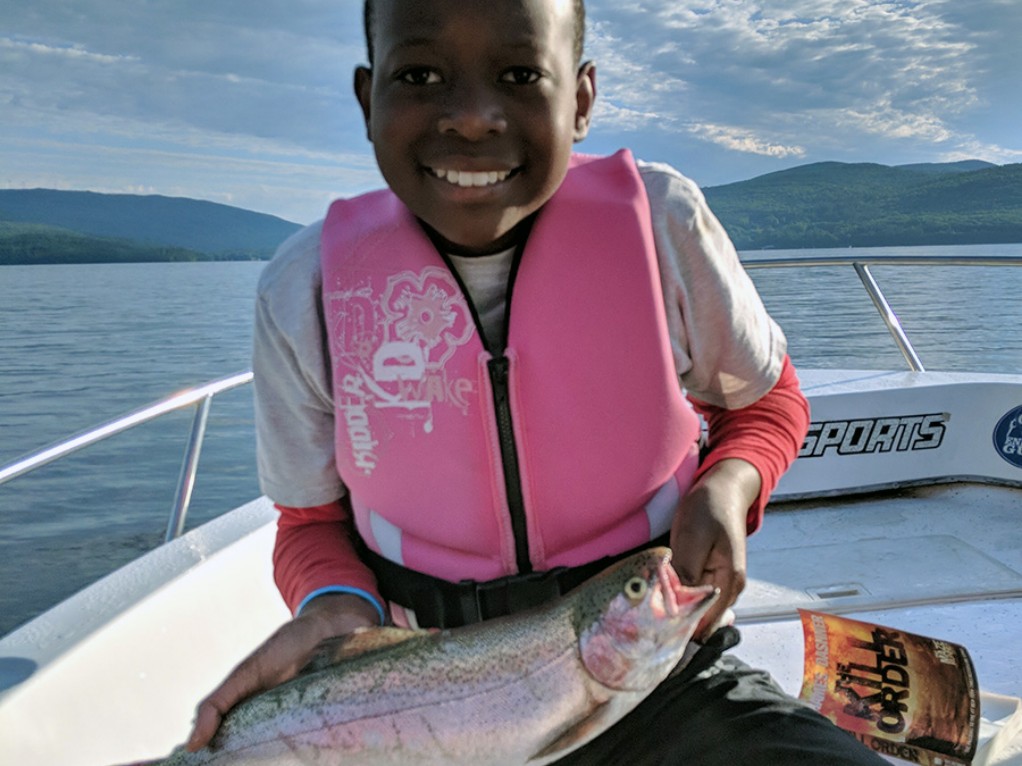
Hiking
Hiking and camping trips are integral parts of the Camp Mowglis experience. Thursday is hiking day, and every hiking day, each age group goes on a different hike. The youngest campers start with easier day hikes; the older campers go on challenging multi-day hiking and camping trips. Being located in the White Mountains of NH means there are hundreds of hiking trailheads within 45 minutes drive of Camp Mowglis.
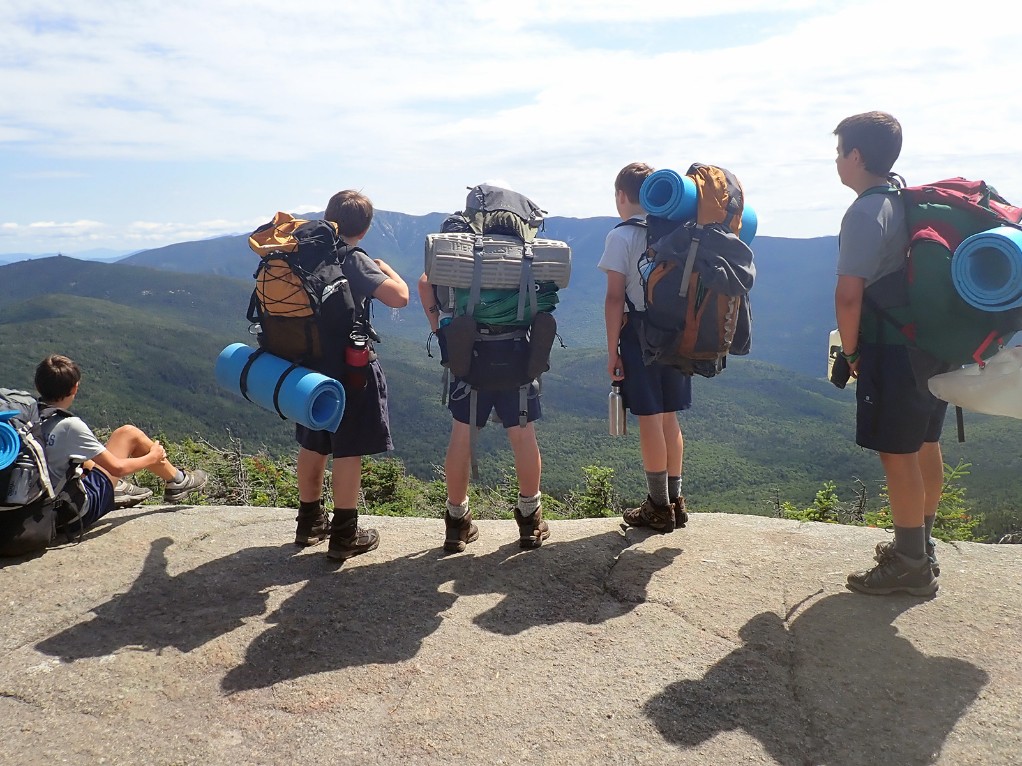
As the summer progresses, each hiking trip is slightly more challenging than the week before. This allows campers to increase their hiking stamina and camping skills. The Brown Ribbon is acquired by campers once they gain skills in orienteering, accumulate trail miles, and climb a number of White Mountain peaks over the course of their Mowglis career. Nature, The Purple Ribbon, is awarded to those boys who have learned a good deal about the plant and animal life around them, and have an understanding of human interactions within the ecosystem.
Nature Studies
Campers in the Nature Industry learn all about the plants, animals, and ecosystems surrounding Camp Mowglis. From the lake to the mountains and forests, Nature studies at Mowglis teaches campers all about the natural world around them!
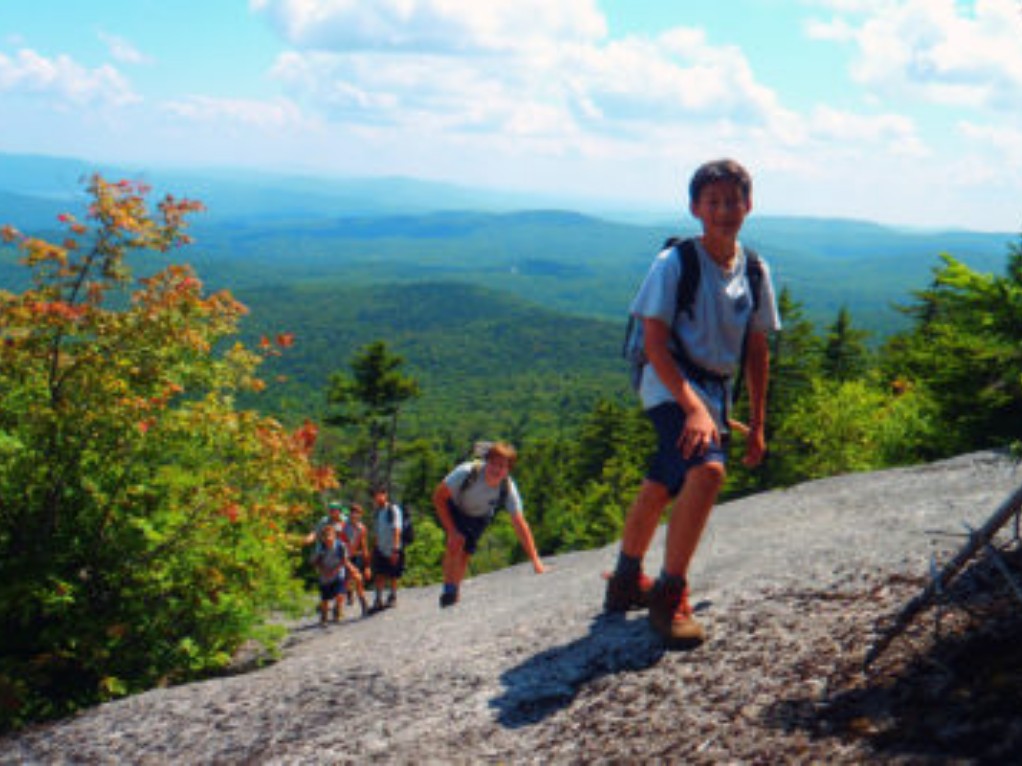
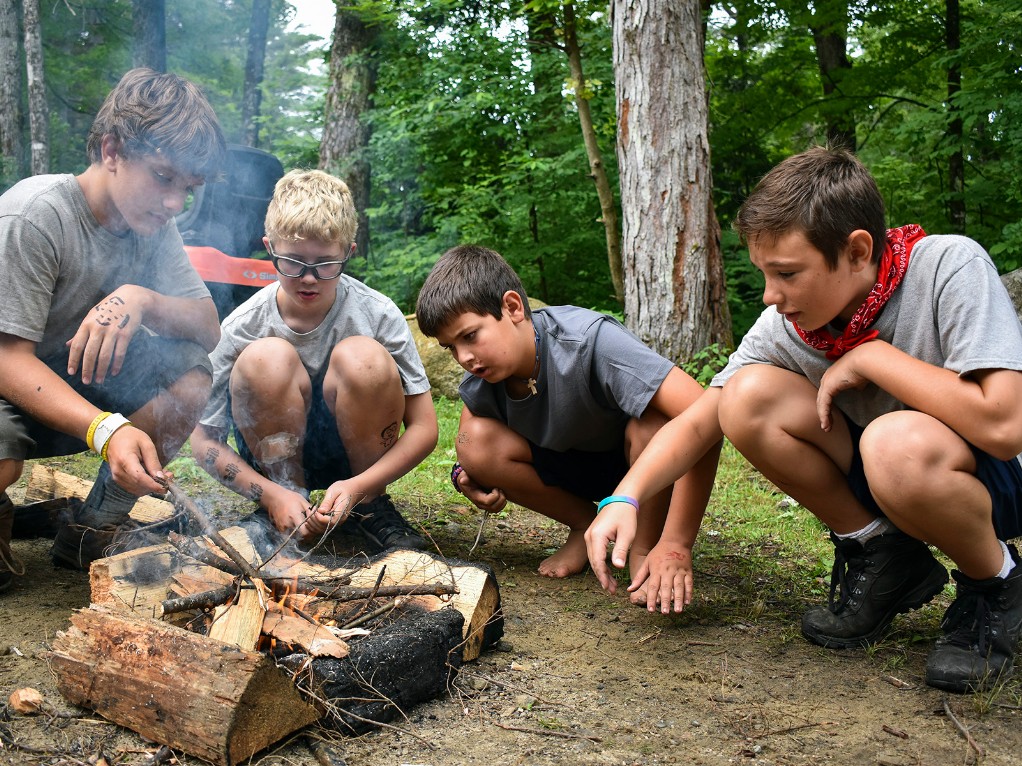
Paddle Boarding
Stand Up Paddle Boarding (SUP’ing) is offered as a sign-up activity and is a great way to get out on the beautiful waters of Newfound Lake. Never been on a SUP? No worries! Our instructors will have you up and paddling in no time flat. You’ll be amazed by how stable the paddle boards are as you cruise around. Standing up above the water gives a great perspective on the lake and is a great way to enjoy the lake!
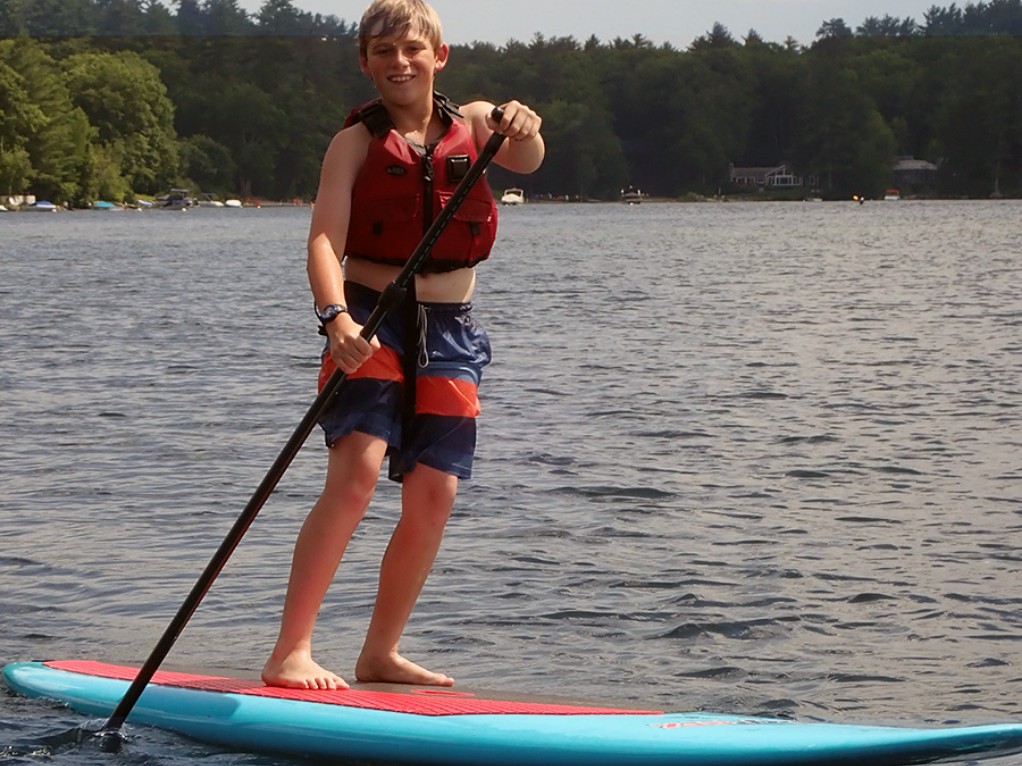
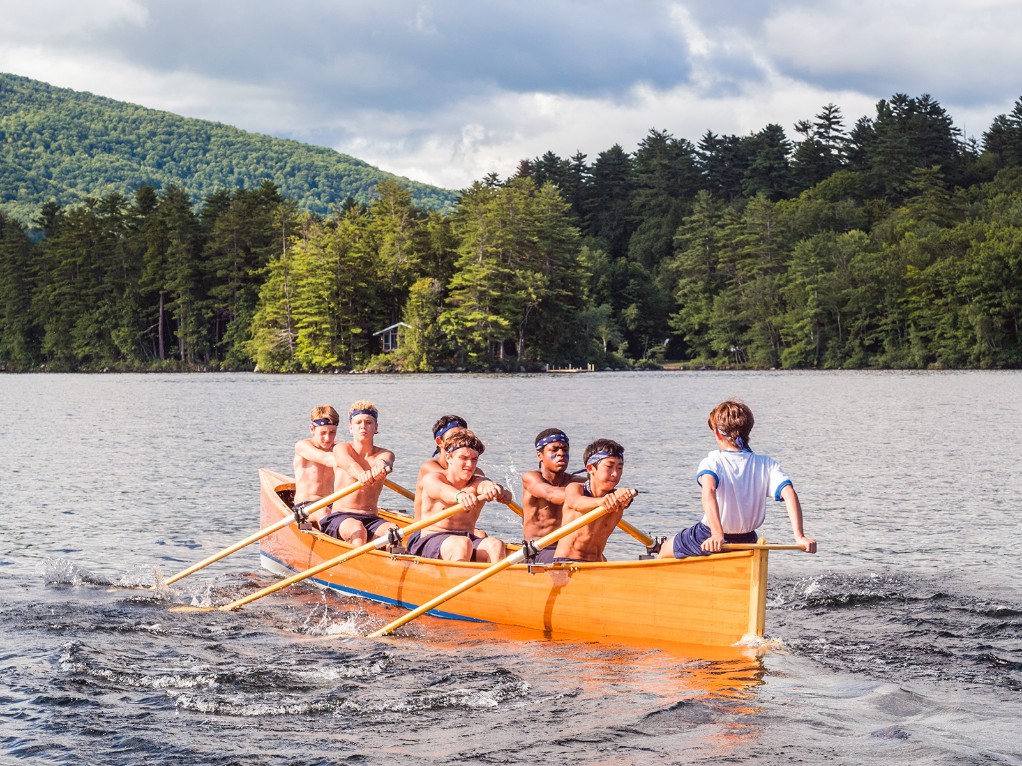
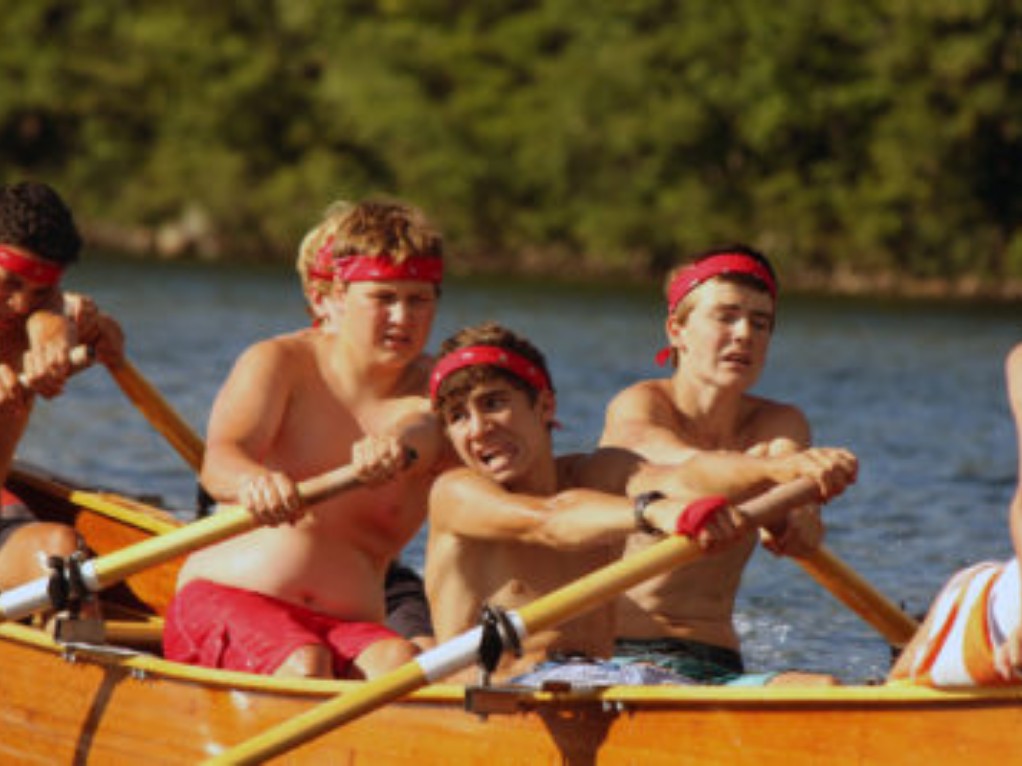
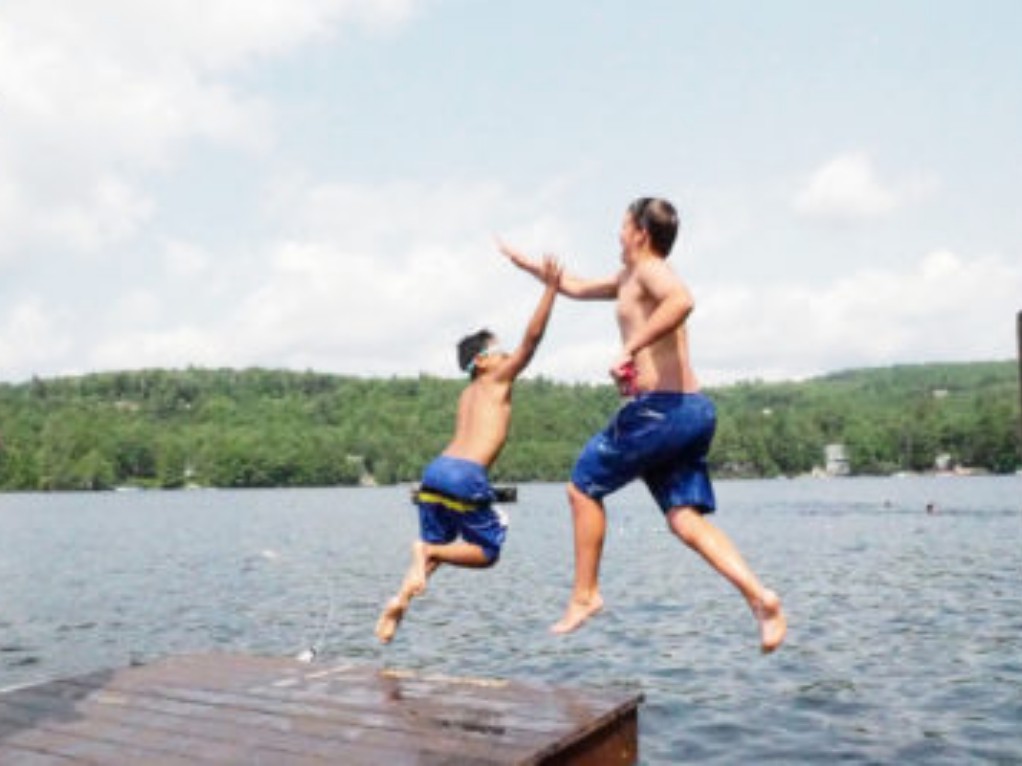
Photography
The Black and White Ribbon teaches campers the basics of photography. They learn how to take photos, and develop an understanding of the equipment and the development process.
Riflery
Respect for firearms, knowledge of safety precautions, and target shooting have been a part of the Mowglis program for generations. Riflery teaches boys patience, how to listen closely and follow directions, and how to responsibly handle dangerous things. To earn the Red, White and Blue Ribbon campers work hard to achieve all the riflery medals; doing so requires a lot of perseverance, which teaches boys to set and work towards lofty goals.
Rock Climbing
We are very fortunate to be located only minutes away from a world-class rock climbing area in Rumney, NH. In addition to being a fantastic climbing area, Rumney is also an excellent teaching area as the cliffs are not very tall, and there are excellent anchors to set the climbs on.
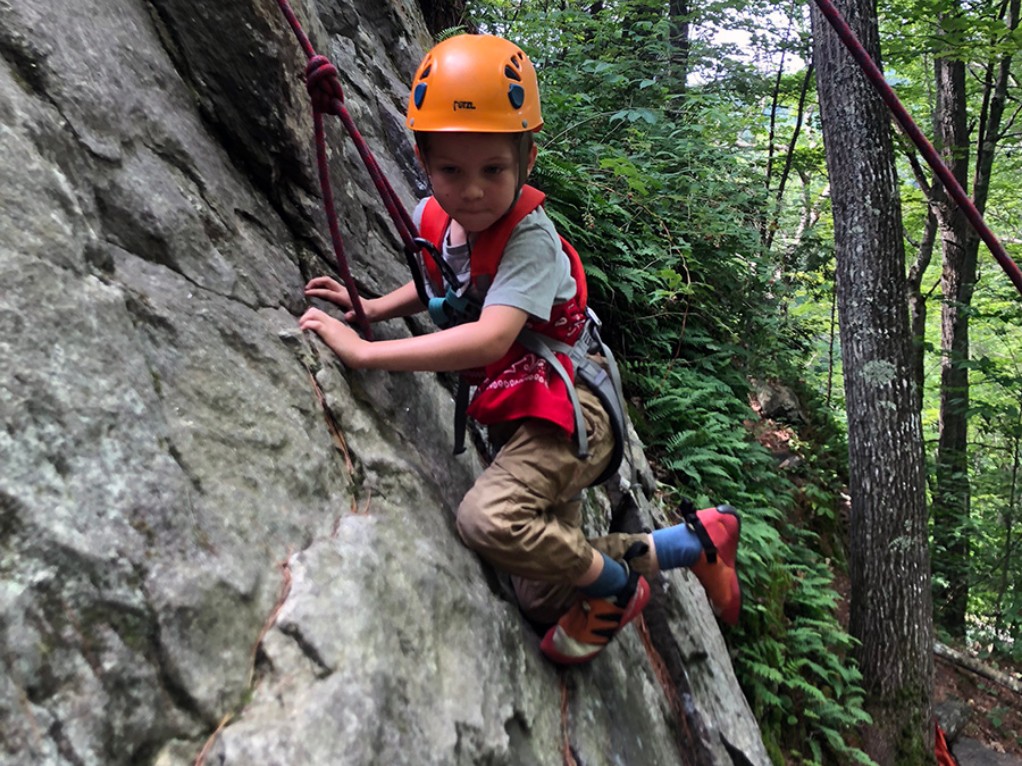
Our climbing instructors are American Mountain Guides Association trained and certified climbing guides who live and breathe rock climbing. While scaling a rock wall may seem very risky, if it is properly instructed and supervised, it is fun, safe, and exhilarating!
Ropes
All campers spend time with their dorm-mates at the Mowglis Ropes Course to work on teamwork, communication, and problem-solving skills… and have a great time along the way! Our Ropes Course was professionally designed and built on a peninsula right on the lake and will take you to the treetops safely “belayed” by our professionally trained and certified ropes course facilitators. The Ropes Course is exhilarating, challenging, and a LOT of fun!
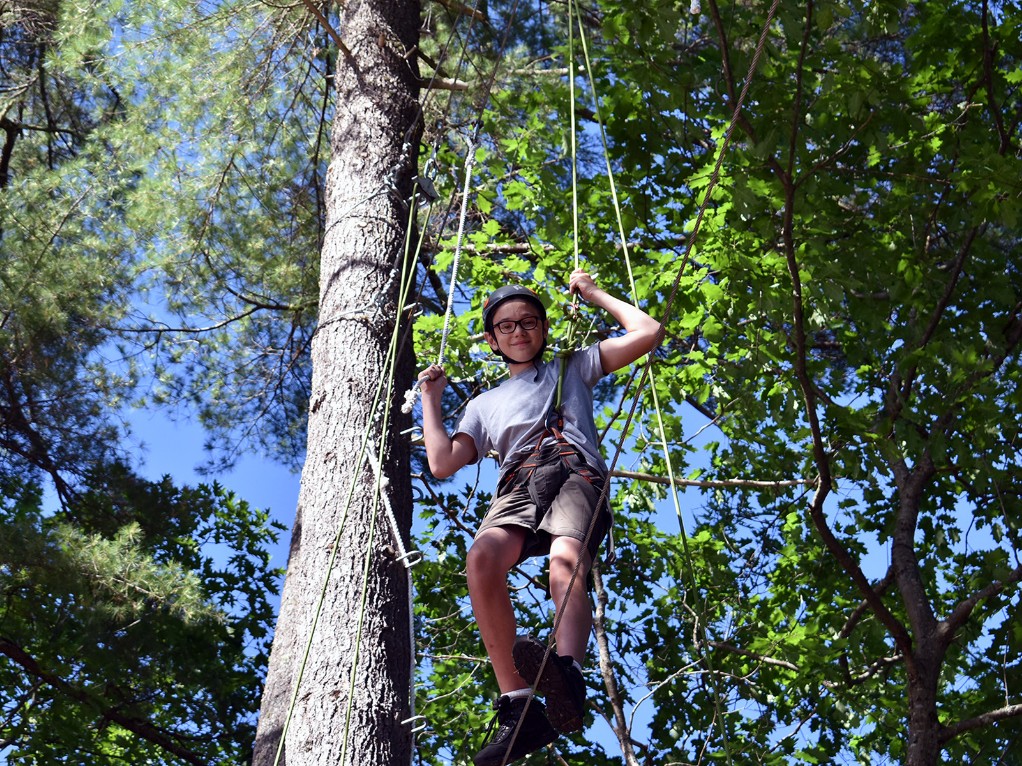
Rowboating
The Silver Ribbon includes the skills needed to handle traditional wooden rowboats. Campers who pass the Rowboat Safety Test can take a boat out on their own, or with a friend.
Sailing
Mowglis has several different sailboats for recreation and instruction. Recently, three 420s were added to the program. All the parts of the boats, safety, and sailing ability are taught. Newfound Lake provides a great place to learn how to sail. The Skipper’s Test qualifies a camper to take out a boat alone, and the Golden Anchor provides all the skills needed for a committed small-boat sailor.
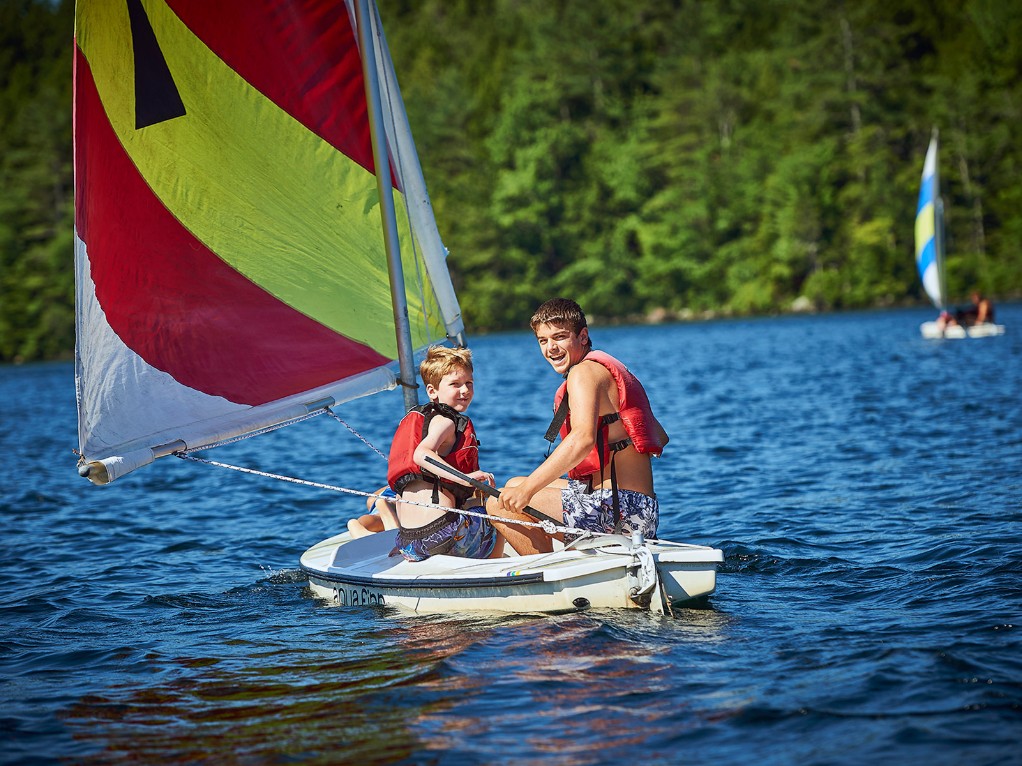
Swimming
The Mowglis waterfront is a true gem, and campers of all ages learn to become strong swimmers. The White Ribbon follows the American Red Cross progression, which is a major part of the Mowglis program. All boys are encouraged to advance their swimming skills. Safety awareness and a certified staff make the waterfront a safe and fun place to be each day.
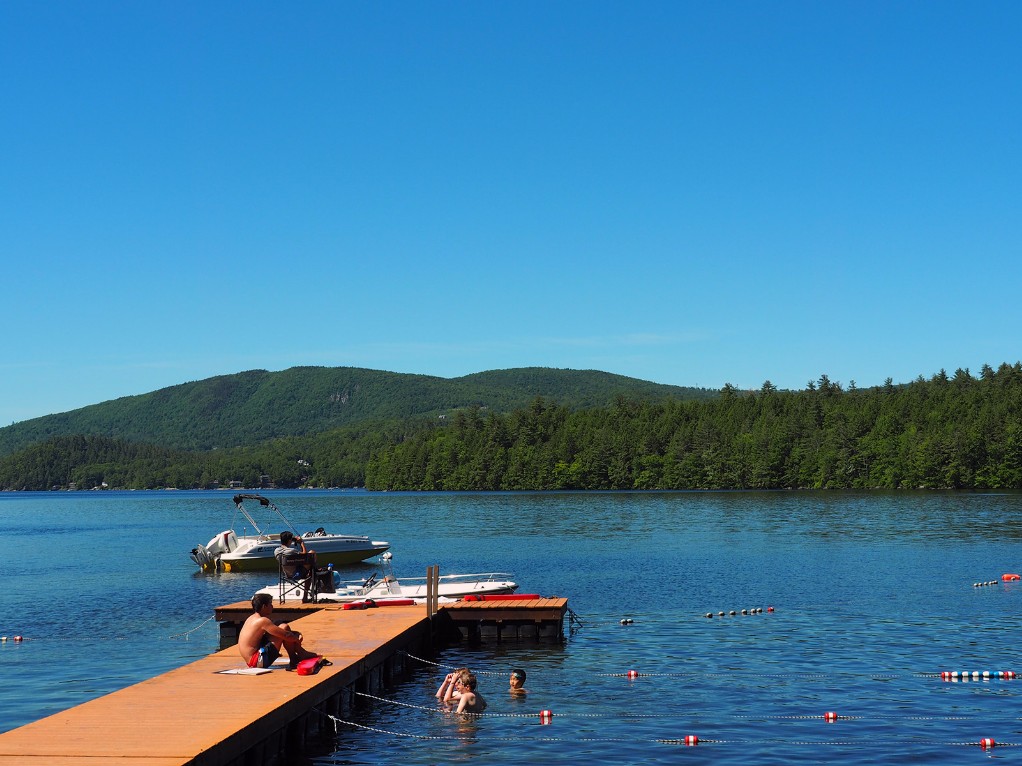
Tennis
Mowglis has two clay tennis courts for recreation and instruction. The Yellow Ribbon is a popular one, and many boys dream of the clay courts of the French Open.
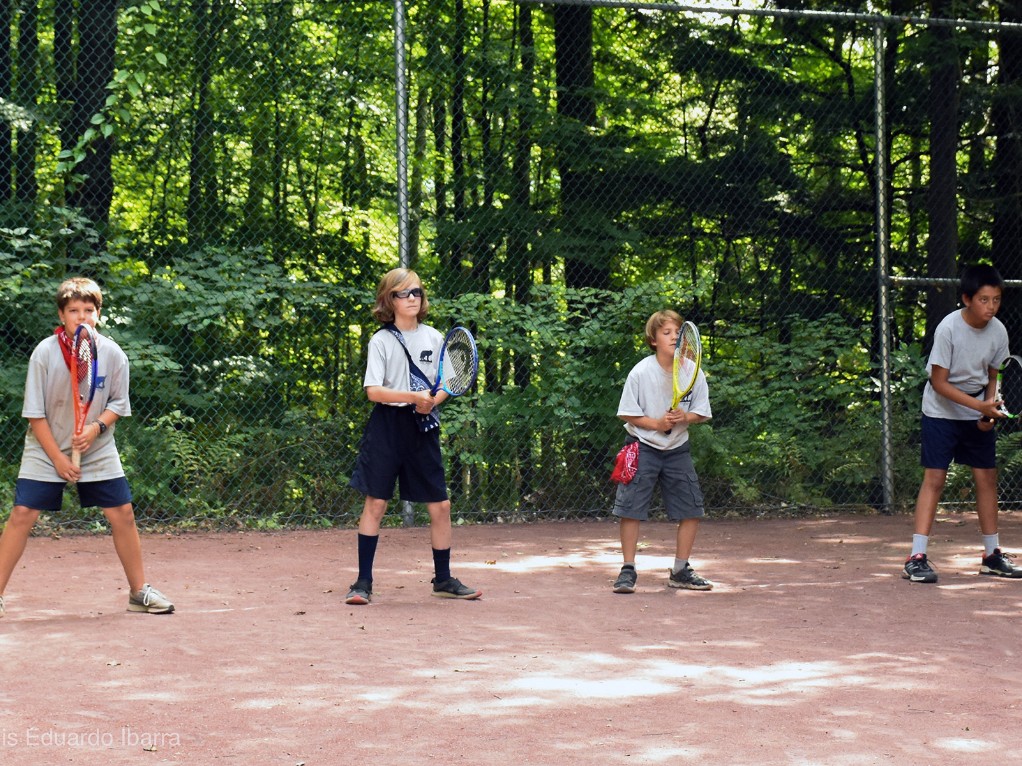
Woodworking
Woodworking is the Gold Ribbon. Boys learn how to use hand tools properly and receive basic instruction in power tools by highly qualified counselors. Projects such as tool boxes and bookshelves are constructed in the wood shop.

If you do not find the date/time you are looking for or have a question, click above button to contact the provider.
Established in 1903, Mowglis is a non-profit residential camp located in Hebron, New Hampshire and offers a traditional summer camping experience for boys ages 7 to 15.
Attending camp Mowglis helps boys develop confidence, independence, personal resources, and a sense of responsibility toward others and the environment, all while having fun and making lifelong friends.
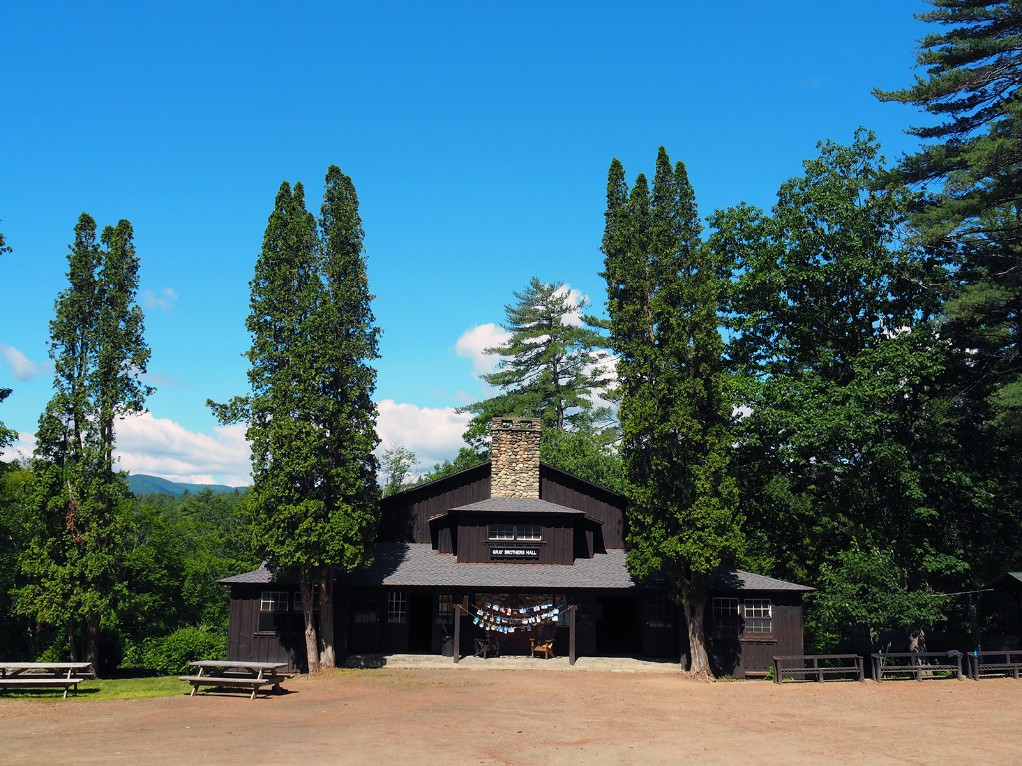
Mission & Philosophy
The mission of Camp Mowglis is to develop integrity, empathy, resilience, and leadership in young men through the time-tested and fun outdoor experiential program and community we call The School of The Open.
In a setting of forests, lakes, and mountains, Mowglis provides a wholesome learning experience through which campers develop confidence, independence, personal strength, a sense of responsibility towards others and the environment…and have a TON of FUN!
Each Mowglis camper builds strong friendships and learns lessons that last a lifetime. From the youngest Cub to the oldest boys of the Pack, each is a valued member of the Mowglis family. At camp we focus on personal growth, character development, and community building.
Camp Mowglis Core Values
- Treat each other with kindness
- Respect the natural life that surrounds us
- Give to others with generosity of heart
- Lead when called to lead; follow when called to follow
- Be the first to volunteer and the last to complain
- Find the best in every moment
- Have the wisdom to know what is right and the courage to act
- Dare to be the best you can be
- Act with humility
Growing as an Individual
Mowglis offers a personal growth experience for every individual in our community. We encourage the boys to become well-rounded individuals, and to challenge themselves physically, mentally, and emotionally while learning competence, confidence and respect. The structure of the program, and its goal-oriented approach keeps campers motivated to try new things, and to excel in their efforts at all levels of ability.
Along with the practical skills that are learned through the program, boys gain confidence in themselves. Campers participate rather than observe and try new things in a supportive environment. They also experience the satisfaction associated with realizing their goals and being recognized by peers and staff. Recognition like earning ribbons, admission to the Inner Circle, honor hiking squads and racing crews are a big part of the Mowglis experience.
Developing a Strong Sense of Character
At the core of the Mowglis mission is a commitment to create youth of sturdy character based on the establishment of the timeless values of honesty, integrity, compassion, and respect for others. Pursuit of these values lays the foundations for everything we do. At Mowglis, we simply try our best in everything we do. This means being sincere and thoughtful and displaying sound judgment by choosing right over wrong in both word and deed.
Learning to Live as a Member of a Community
At Mowglis, the benefit of a seven week residential program is hard to replicate. It gives each camper the opportunity to learn the patience and tolerance that naturally occur as a diverse community lives and grows together. Part of each camper’s personal growth is gaining respect for those around him. Campers also gain respect for nature by living in beautiful outdoor surroundings.
Meet Our Director
Camp Director — Nick Robbins
Hi, I’m Nick. Dad, nature lover, ski patroller, philosophy geek, lifelong “camp guy”, and Director here at Camp Mowglis.
I’ve always loved the outdoors, teaching folks about the outdoors, working with people, and thinking about life’s big questions. After graduating from the Colorado College with a Philosophy degree, I sought a career that would involve my dual passions for outdoor education and emergency medicine, which led me to become the camp Emergency Medical Technician at another excellent New Hampshire summer camp in 2002. Life works in mysterious ways, and I spent eleven years at that camp, cutting my teeth in the industry and learning the ins and outs of running a successful camp. I worked my way up, first to Assistant Director, and then to year-round Camp Director, a position I held from 2005 to 2013.
After a decade of helping that program grow exponentially, I was ready for more. I wanted a smaller, mission-driven camp that was more outdoorsy and had deeper ties to youth development. I wanted something that really stirred my soul. When I found Camp Mowglis, I knew it was The One instantly. I’ve been the Camp Director here since 2013.
In addition to being Director of Mowglis, I’m an Accreditation Visitor for the American Camp Association which means that I visit other camps during their operating season to make sure they’re following all the industry best practices for health and safety. I sit on the boards of the New Hampshire Camp Directors Association as well as the American Camp Association’s New England Chapter; during the winter I maintain an active role with the National Ski Patrol as a certified Outdoor Emergency Care Provider. I also have a significant emergency medical background (former EMT) and have led wilderness trips for all ages of kids and teens throughout the country and abroad.
I’m not one of those Camp Directors who lurks in the office. I’m always out around camp and I’ll personally know your son and vice versa. I’m a dad too. I get safety concerns, worries about fitting in, homesickness, all of it. I strive to be the kind of Camp Director I would want looking out for my kids.
That’s why I work very closely with our camp families before, during, and after the summer. We both want the same thing: a positive environment to teach your son to be a great man — and have a ton of fun along the way.
Our Staff
Mowglis counselors are selected not only for their skills and qualifications, but also for the example they provide. Some of the staff members are school teachers, and many were campers at Mowglis. We have a 3:1 camper to staff ratio.
Everyone who works at Camp Mowglis is committed to continue the traditions that have defined this special place for more than a century.
All of our counselors are of strong character, are exceptional role models, and have completed at least one year of college. During our rigorous application process, we perform thorough interviews, reference checks, and criminal background checks in order to select the best men and women for the job.
Yes, you read that correctly — we said “women”. About ⅓ of our staff is female — from our TripMaster to all of our Cub Moms (who live with our youngest campers).
We take our responsibility of caring for your son very seriously. Every staff member goes through our comprehensive 14-day orientation before campers arrive. They are trained in many areas, including:
- Wilderness First Aid certification
- CPR certification (we also have a full-time nurse on staff and the hospital is only 15 minutes away)
- Homesickness training
- Crisis management
- Archery and Riflery Instructor Certification
- American Red Cross lifeguard certification (waterfront staff)
- Water Safety Instructor certified (swim instructors)
Most of our counselors stay with us for a handful of summers. But they don’t stay forever. After all, our staff are going places — they’re getting internships, they’re exploring career opportunities, they’re growing into the good men and women Mowglis taught them to be.
Contrary to the common depiction in movies that shows summer camp work as an easy job full of goofing off and shenanigans, being a member of the Mowglis Senior Staff is serious business. It is super rewarding, and is definitely a lot of fun, but the level of responsibility for and the influence on our campers that Senior Staffers have mandates that we hire, train, and coach the best of the best.
Facility and Location
The Mowglis campus covers 160 acres on the northeast corner of Newfound Lake in New Hampshire, one of the cleanest and most beautiful lakes in the United States. The main camp is situated on 55 acres located directly on the lake with over 1,300 feet of shoreline.
The camp’s property includes 125 acres of pine woods and open space as well as an extensive shoreline. Throughout camp are playing fields, riflery and archery ranges, clay tennis courts, and a fully equipped crafts shop. Rustic open-air dormitories, assembly halls, and an infirmary are among the facilities set into the wooded surroundings. Two waterfront areas with two boathouses are well suited to water sports, including crew.
One of the most impressive buildings at camp is Grey Brothers Hall. Grey Brothers was rebuilt back in the 30’s with over 500,000 board feet of lumber harvested from the Mowglis grounds. Gray Brothers houses our stage, pianos, music room, library, nature center, and camp scheduling office. There are a number of original Mowglis themed artworks completed by former staff member, and celebrated Native American artist Richard West (aka Cheyenne Chief Wah-pah-nah-yah).
An additional 100 acres are located on the East side of Route 3-A. Activities like orienteering and axemanship take boys across the road and into the woods. A hiking trail (The White-Footed Mouse Trail) passes through here on the way up Plymouth Mountain.
Mowglis is fortunate to have many large eastern white pines whose towering presence graces our grounds, along with a mostly wooded and diverse forest around the center of camp. Raccoons and foxes can be spotted around camp and loons can be heard almost every night. We are a quick 35-minute drive from Franconia Notch, home to some of the most spectacular mountains and trails in New Hampshire’s White Mountains. This gives us many great opportunities to expose the boys to the outdoors and the backcountry.
There are a variety of activities for the campers to choose from while at camp. Each industry is well equipped with the supplies, tools, and space needed for the boys to receive in-depth instruction from their counselors. The trip closet, where the camping industry is based, contains a wide range of outdoor gear including backpacking packs, tents, and cook-sets.
Our expansive waterfront is home to three large swimming areas, a fleet of canoes, kayaks, rowboats, windsurfers, single and four man crew shells, aqua fins and 420 sailboats, along with the two traditional Mowglis crew boats.
History
At the turn of the last century, Boston educator Elizabeth Ford Holt was inspired by Kipling’s Jungle Book stories. In the Jungle Book, a small boy named Mowgli grows up in the jungle and is raised by a wolf pack. Mowgli learns important life lessons from the animals of the jungle, such as trust, teamwork, patience, leadership, empathy, self reliance, and kindness.
Mrs. Holt was concerned that young men were no longer learning many important lessons growing up in urban and suburban environments. It became her dream to establish a place where they could spend the summer learning the lessons that little Mowgli learned in the jungle. In 1903 she purchased a large farm on the shores of Newfound Lake and founded Mowglis School of the Open.
With the permission of author Rudyard Kipling, she was able to borrow names from his Jungle Books, and to this day many of the buildings at Mowglis carry such names as Toomai, Baloo, and Akela. Throughout his life, Mr. Kipling maintained an active interest in this undertaking so strongly influenced by his inspiring and exciting stories.
Mr. Kipling also instructed Mrs. Holt on how to pronounce Mowglis (“Mow” sounds like cow, and “glee”), and how to pluralize the name of Mowgli the boy character in the books, by adding a silent “s”.
In the spring of 1925 Mrs. Holt passed the camp to her long-time Assistant, Col. Alcott Farrar Elwell, who ran Mowglis for 27 years. After the Colonel’s retirement, Mr. Darwin P. Kingsley and Mr. John C. Adams each ran the camp for five years. In 1962 the the Holt-Elwell Memorial Foundation was established to acquire the camp and ensure the continuity of the program as a non-profit institution. To this day the Holt-Elwell Memorial Foundation carries on the traditions that were established in the early 1900s by the founder, Mrs. Holt.
In recognition of Mowglis’ history as one of the first summer camps in American and the first camp for boys under the age of 14, we were added to National Register of Historic Places.
{{item.programName}}








